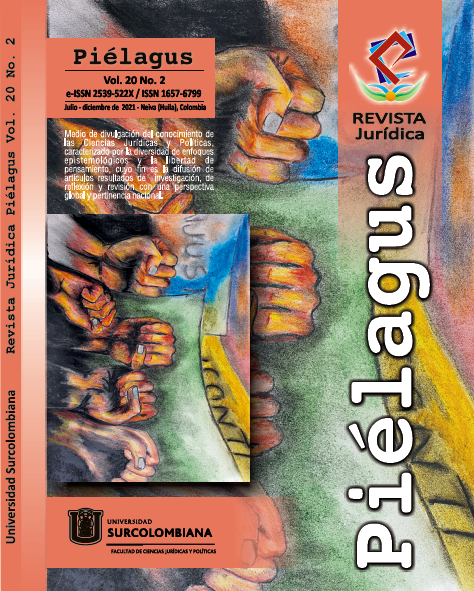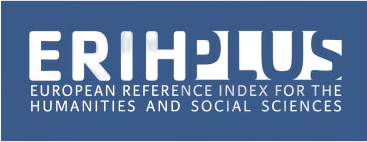Historical memory: comparative analysis of the experiences of Colombia and Russia
Memoria histórica: análisis comparativo de las experiencias de Colombia y Rusia
##plugins.themes.bootstrap3.article.main##
This article examines the phenomenon of historical memory, the different possible states of the phenomenon and two contemporary commemorative actions, one in Colombia and another in Russia, by which these states can be defined. Particular attention is paid to the process of establishing and developing the concept of historical memory, to the conditions that contributed to the development of the phenomenon of historical memory, as well as to the historical situations in countries such as Colombia and Russia, which resulted in the holding of the commemorative actions under research. The article provides comparative analysis of two actions and identifies the similarities and differences between the states of the phenomenon of historical memory.
Downloads
##plugins.themes.bootstrap3.article.details##
I. Artist Doris Salcedo on Bogotá: “The forces at work here are brutal” – video. (2016). The Guardian, <https://www.theguardian.com/cities/video/2016/jul/26/artist-doris-salcedo-bogota-forces-work-brutal-video?CMP=embed_video> [26/3/2021].
II. Assmann, J. (2011). Cultural Memory and Early Civilization. Cambridge University Press.
III. Davletshina, D.G. (2012). La memoria social como base de la moralidad de la persona. Tesis de Doctorado en Filosofía. Universidad de Medicina Estatal de Bashkir. (Давлетшина Д.Г. Социальная память как основа нравственности человека. Автореф. дис. канд. философ. наук // Башкирский государственный медицинский университет).
IV. “Gracias Doris Salcedo por existir, por conmovernos...” (2016). Twitter, <https://twitter.com/ClaudiaLopez/status/786024986544922624> [26/3/2021].
V. Halbwachs, M. (2005). On Collective Memory. University of Chicago Press.
VI. Halbwachs, M. (2007). The Social Framework of Memory. North Stratford: Ayer Company Publishers.
VII. Hervieu-Léger, D. y Willaime, J.-P. (2001). Sociologies et religion: Approches classiques. Paris: PUF.
VIII. Hutton, P.H. (2004). History as an Art of Memory. University Press of New England.
IX. Malagón Llano, S. (2016). “Me he pasado toda la vida sumando ausencias” // Semana, <https://www.semana.com/nacion/articulo/acto-simbolico-de-doris-salcedo-en-la-plaza-de-bolivar/498091> [26/3/2021].
X. Mazur, L.N. (2013). La imagen del pasado: formación de la memoria histórica. Noticias de la Universidad Federal de los Urales. Ciencias humanitarias, № 3 (117), 243-256. (Мазур Л.Н. Образ прошлого: формирование исторической памяти // Известия Уральского федерального университета. Гуманитарные науки. № 3 (117). 243-256).
XI. Miller, A.I. (2016). Politics of Memory in Post-Communist Europe and Its Impact on European Culture of Memory // The Journal of Political Theory, <https://www.researchgate.net/publication/328109375_Politics_of_Memory_in_Post-Communist_Europe_and_Its_Impact_on_European_Culture_of_Memory> [26/3/2021].
XII. Miller, A.I. (2018). Política de memoria en Rusia, los países de la UE y los estados del espacio postsoviético: tipología, potencial de conflicto, dinámica de transformación // Instituto de información científica para Ciencias Sociales, <http://inion.ru/site/assets/files/3626/metodologicheskie_voprosy_izucheniia_politiki_pamiati.pdf> [26/3/2021]. (Миллер А.И. Политика памяти в России, странах ЕС и государствах постсоветского пространства: типология, конфликтный потенциал, динамика трансформации // Институт научной информации по общественным наукам РАН // http://inion.ru/site/assets/files/3626/metodologicheskie_voprosy_izucheniia_politiki_pamiati.pdf, дата обращения 26.03.2021).
XIII. Nora, P. (1997). Les Lieux De Memoire 3 Volumes. Paris: GALLIMARD.
XIV. Nora, P. (2005). Triunfo mundial de la memoria. Reserva Inviolable, № 2-3, 40-46. (Нора П. Всемирное торжество памяти // Неприкосновенный запас. № 2-3. 40-46).
XV. Nora, P. y Ozouf, M. y Puimege, J. y Winok, M. (1999). Francia-memoria. San Petersburgo: La Editorial de la Universidad Estatal de San Petersburgo. (Нора П., Озуф М., Пюимеж Ж., Винок М. Франция-память. СПб.: Издательство С.-Петерб. ун-та).
XVI. Repina, L. (2003). La memoria cultural y los problemas de la historiografía. Moscú: Escuela Superior de Economía. (Репина Л.П. Культурная память и проблемы историописания. М.: ГУ ВШЭ).
XVII. Ricker, P. (2004). Memoria, Historia, Olvido. Moscú: Editorial de literatura humanitaria. (Рикёр П. Память. История. Забвение. М.: Издательство гуманитарной литературы).
XVIII. Rubiano, E. (2017). Las víctimas, la memoria y el duelo: el arte contemporáneo en el escenario del postacuerdo // Análisis Político, <https://www.researchgate.net/publication/320721271_LAS_VICTIMAS_LA_MEMORIA_Y_EL_DUELO_EL_ARTE_CONTEMPORANEO_EN_EL_ESCENARIO_DEL_POSTACUERDO> [26/3/2021].
XIX. Yakhshiyan, O. (2016). Política histórica en Ucrania durante la presidencia de V.A. Yushchenko // “Observador-Observer”, <https://elibrary.ru/item.asp?id=26739895> [26/3/2021]. (Яхшиян О. Историческая политика на Украине в президентство В.А. Ющенко // «Обозреватель-Observer» // https://elibrary.ru/item.asp?id=26739895, дата обращения 26.03.2021).















